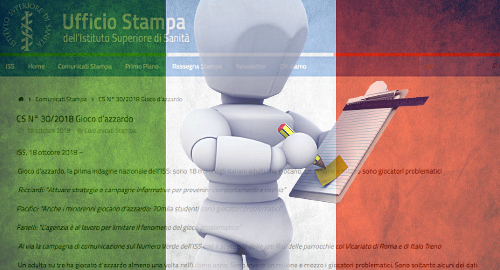 Italy’s gambling advertising ban isn’t likely to reduce the nation’s number of problem gamblers, at least, if the findings of a new gambling participation survey are any indication.
Italy’s gambling advertising ban isn’t likely to reduce the nation’s number of problem gamblers, at least, if the findings of a new gambling participation survey are any indication.
On Thursday, Italy’s Istituto Superiore della Sanità (ISS) health agency released the results of a survey commissioned by Italy’s gambling regulator AAMS into the scope of the nation’s gambling activity. The survey queried over 12k adults, making it the largest such study ever conducted in the country.
The survey found that 18.4m Italians – around 36.4% of the population – gambled at least once in the past 12 months. That ranks Italy fifth among large European countries in terms of gambling participation, behind Spain (75.7%), the UK (63%), France (56.2%) and Germany (39%).
Of these 18.4m souls, around 13m are considered ‘social’ gamblers with no issues resulting from their activity. Around 2m are considered at ‘low risk’ of developing into problem gamblers, while a further 1.4m are considered at ‘moderate risk’. The remaining 1.5m are considered true problem gamblers, although only 13k individuals’ activity has been so extreme that they’ve sought professional help for their condition.
The survey found that problem gamblers are most likely to be between the ages of 55-64 years old and are more likely to favor slots, video lottery terminals and virtual betting, all of which are primarily land-based activities in Italy. Problem gamblers were also more likely to favor gambling activities that are unapproved by the state, both land-based and online.
Mirroring studies in other countries, ISS found that Italy’s problem gamblers were more likely to abuse alcohol, tobacco and other drugs, making it more accurate to describe these individuals who have difficulty resisting temptation in all its forms, as well as assessing and adapting to risky situations.
Italy’s new government recently announced plans for a blanket prohibition on gambling advertising and sponsorships, ostensibly out of a desire to limit the further spread of problem gambling activity. This ban is currently the subject of a number of legal challenges, including multiple petitions filed in European Union courts by mobile casino operator LeoVegas,
But the ISS survey suggests this ban will likely fail to achieve its stated goals. The survey found that only 19.3% of Italians who actively gambled last year said they were inspired to play after seeing a gambling advert, while the other 80.7% said advertising had no effect whatsoever on their willingness to gamble.
Moreno Marasco, president of Italian gaming operator association Logico, issued a statement saying the ISS survey “shows that online [gambling] is an almost insignificant slice of the problems” facing Italy’s gamblers. Marasco added that “it would make sense” to use the survey’s findings re the ineffectiveness of gambling advertising in formulating the country’s gambling policies.